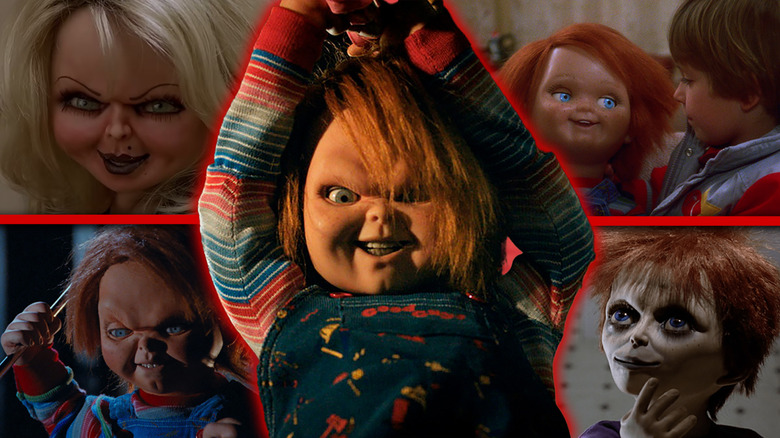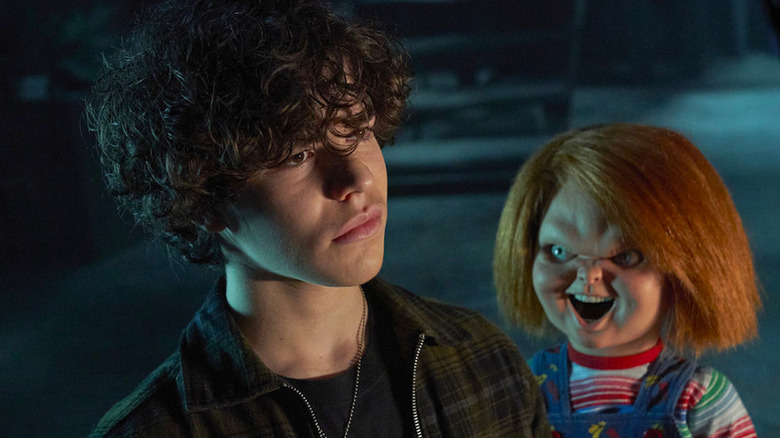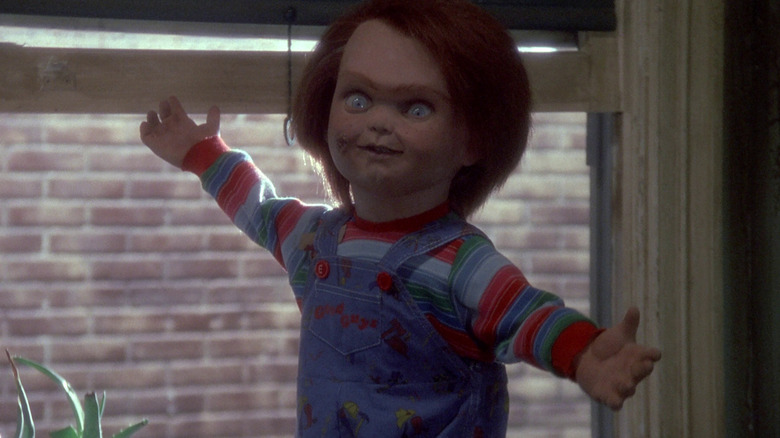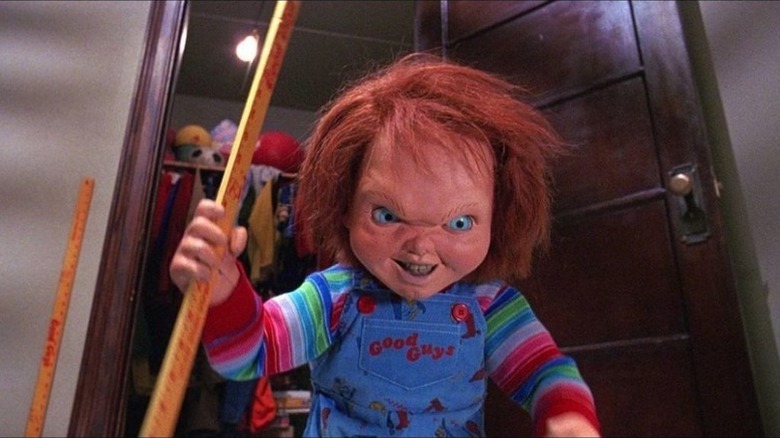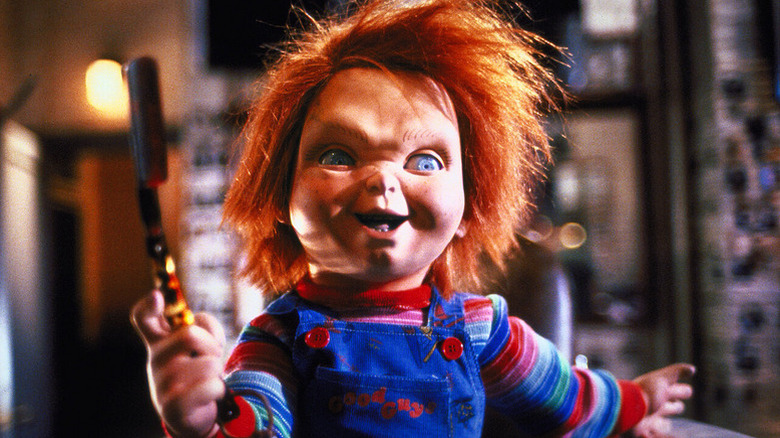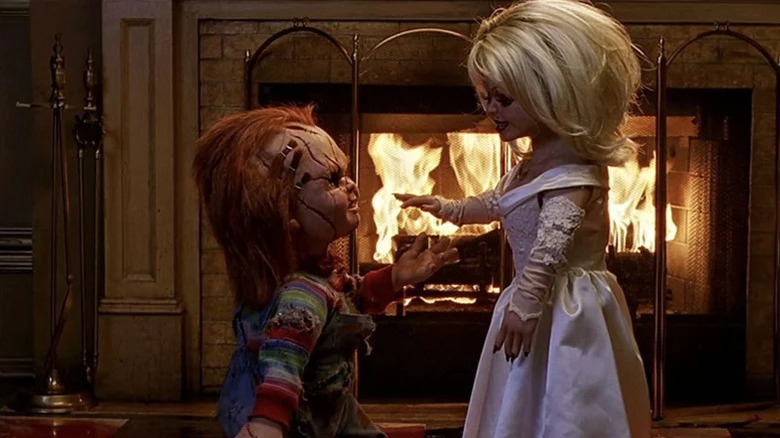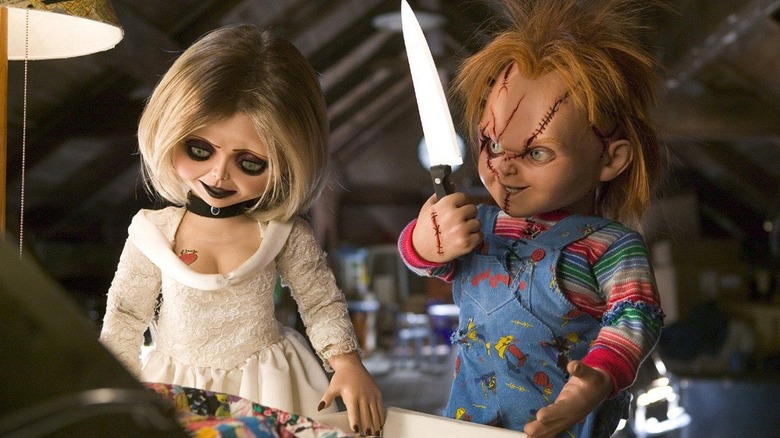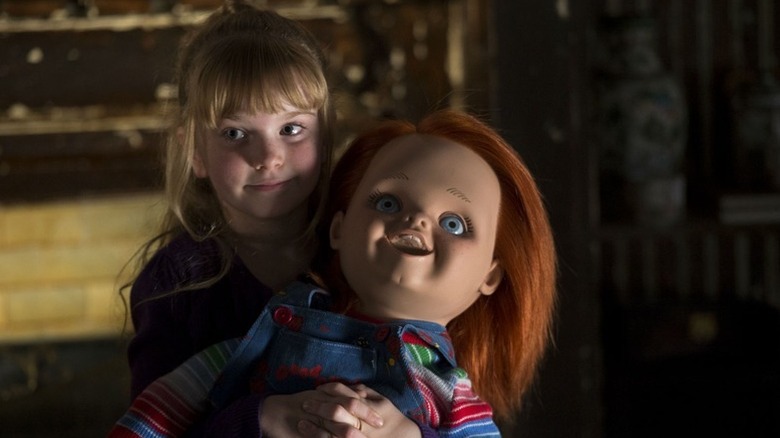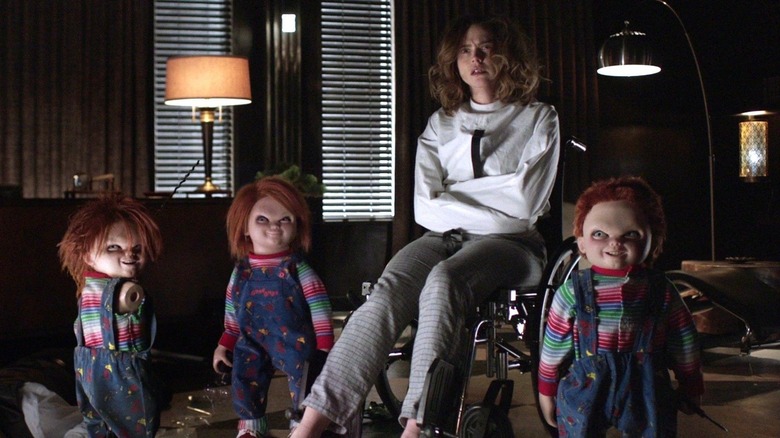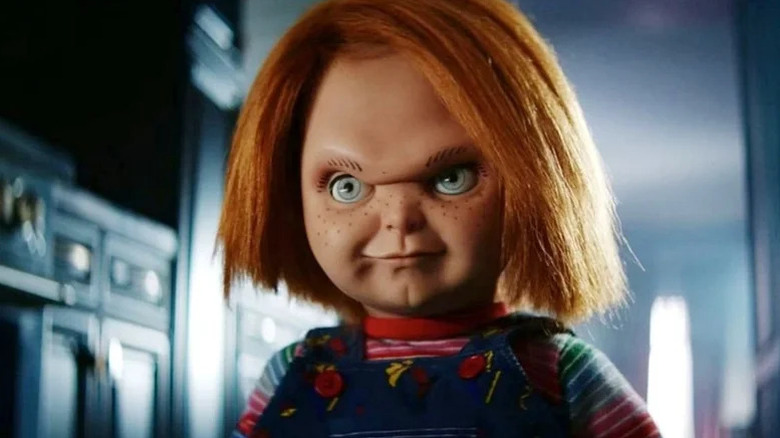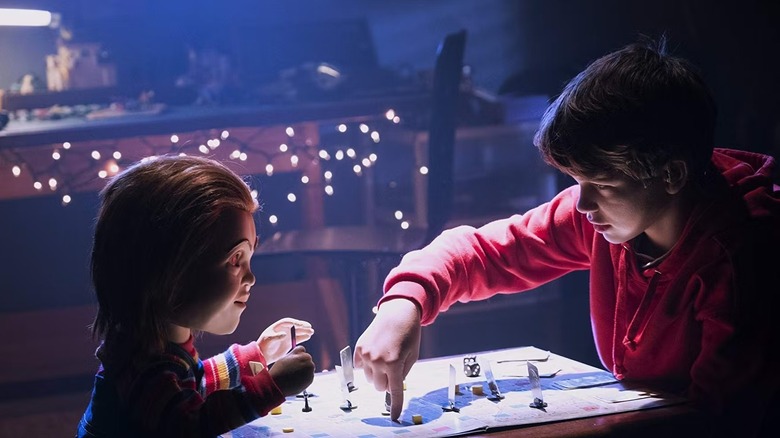How To Watch The Chucky Movies In Order
One of the most enduring horror franchises that launched in the '80s is "Child's Play," created by filmmaker Don Mancini. The movie series follows a seemingly normal doll who becomes possessed by the soul of a serial killer named Charles Lee Ray aka Chucky. Initially retaining his cover as an innocent Good Guy doll, Chucky inevitably unleashes a wave of murder and mayhem whenever he's taken in by new owners. The 1988 original movie has since spawned a line of sequels, a television spin-off series, and a cinematic reboot without Mancini's involvement.
Simply put, Chucky never dies as the "Child's Play" franchise continues to thrill generations of horror fans across a variety of media. For those that are new to the franchise, they may have questions where to start and how to progress in viewing the entirety of Chucky's bloody exploits. Given that Chucky has seen a hard reboot and a canonical expansion into television, the prospect of a viewing order can feel a bit daunting. With that in mind, here is how to watch the Chucky movies in order and best experience "Child's Play" in full.
Release order versus recommended order
For those aware of the series' behind-the-scenes history, the generally accepted rule is that any project in the franchise involving Mancini retains the original canon. Furthermore, the Mancini projects, both on film and television, are all released in chronological order within the franchise's established continuity. The complicating detail is the fact that the "Child's Play" remake was released in the middle of Mancini's projects and exists in its own standalone continuity. Some would argue that there was literally no good reason to remake "Child's Play," but the reboot was very much made and released theatrically.
Given these details, here is the release order of "Child's Play" projects on film and television:
-
Child's Play (1988)
-
Child's Play 2
-
Child's Play 3
-
Bride of Chucky
-
Seed of Chucky
-
Curse of Chucky
-
Cult of Chucky
-
Chucky
-
Child's Play (2019)
However, for viewers who prefer watching the story unfold in canonical and chronological order, there is a separate watch order. What follows is the "Child's Play" viewing order that we strongly recommend to undertake instead.
Child's Play (1988)
The original "Child's Play" begins with notorious murderer Charles Lee Ray (Brad Dourif) mortally wounded by police detective Mike Norris (Chris Sarandon). Before dying, Ray transfers his soul into a Good Guy doll with a voodoo spell as the toy store he's hiding out in is struck by lightning. Struggling single mom Karen Barclay (Catherine Hicks) picks up the doll for her son Andy (Alex Vincent), unaware of its sinister true nature. As Ray asserts himself as Chucky, he seeks revenge for those who wronged him while looking for a way to transfer his soul into a human body.
The "Child's Play" crew debated making Chucky more like Jaws, limiting the killer doll's murderous actions on-screen, though that restraint is quickly done away with. The movie progresses briskly, tracing the origins of its killer toy right before marching towards its murderous ending. Though the movie seemed to bring Chucky's existence to a gory conclusion, no good horror villain ever stays dead and this was especially true of Charles Lee Ray.
Child's Play 2
Though Chucky (Dourif) was shot to pieces in the first movie, he was resurrected in the 1990 direct sequel "Child's Play 2." To combat the bad PR caused by Chucky's rampage two years prior, the toy manufacturer reassembles him in the midst of a deadly power surge. Revived within the repaired doll, Chucky tracks down Andy (Vincent), who has since been adopted by a foster family. Chuck tries to complete the ritual to transfer his soul into Andy's body before his doll form becomes more human and vulnerable, culminating in a gruesome rematch.
Arguably, "Child's Play 2" is the best Chucky movie, striking up a more coherent balance between horror and dark comedy. With the mystery behind Chucky's nature resolved, the movie leans more into the resurrected killer upping his body count. This includes some of the most inventive kills in the franchise, including a deliriously painful demise for Chucky himself. Eager to build up the franchise after acquiring the property, Universal had Mancini begin working on a sequel immediately, meaning Chucky wouldn't stay dead for long.
Child's Play 3
Though "Child's Play 3" was released only nine months after its predecessor, in August 1991, the sequel features a significant time jump. Taking place eight years after the preceding movie, the abandoned factory where Chucky (Dourif) was presumably destroyed resumes toy production. With his soul transferred into a new doll by accident, Chucky tracks down the teenage Andy (Justin Whalin) to the military school where he now attends. Chucky is now intent on transferring his soul into the body of Andy's classmate Ronald Tyler (Jeremy Sylvers) as he kills people around the school.
With its rushed production and uninspired setting, "Child's Play 3" was the weakest movie in the franchise at that time. "A Nightmare on Elm Street" inspired Don Mancini's "Child's Play" and that distinction is more noticeable here, as Chucky doubles down on his mean-spirited wisecracks like a pint-sized Freddy Krueger. Unfortunately, that brings the sequel more into eye-rolling camp than the well-measured horror and comedy from its predecessor. The franchise's timeline may have taken a big jump forward with its 1991 installment but, unfortunately, its overall quality did not leap ahead with it.
Bride of Chucky
After a seven-year hiatus, the Chucky franchise was revived with the 1998 sequel "Bride of Chucky," this time putting its primary focus squarely on Chucky himself. Set several months after "Child's Play 3," the movie introduces Tiffany Valentine (Jennifer Tilly), the ex-girlfriend of Charles Lee Ray (Dourif), who revives Chucky with a voodoo ritual. Chucky returns the favor by killing Tiffany's human body and transferring her soul into a similar bride doll. The murderous couple decide to transfer their souls into a young couple on a cross-country trip, killing plenty of hapless victims along the way.
Starting with "Bride of Chucky," the "Child's Play" franchise began leaning heavily into a more self-aware sense of humor. The scares and vicious kills are still abundantly present, but the comedy is definitely played up starting with the 1998 entry. In Jennifer Tilly's Tiffany, Chucky finally gets a strong lethal foil, one that becomes a strong recurring character moving forward. For those looking for help to conquer their fears of Chucky, "Bride of Chucky" provides that opportunity in full because it's a bloody good time at the movies.
Seed of Chucky
The last Chucky movie in the franchise's main continuity to receive a wide theatrical release was 2004's "Seed of Chucky." Set six years after "Bride of Chucky," the child of Chucky (Dourif) and Tiffany (Tilly) is a genderfluid doll, voiced by Billy Boyd, who goes by both Glen and Glenda. Glen/Glenda escapes their abusive owner and resurrects Chucky and Tiffany when they discover the truth about their lethal parentage. The reunited family tries to find suitable human hosts to possess, with Tiffany taking a strong interest in actor Jennifer Tilly.
"Seed of Chucky" is the first in the series directed by Mancini, in addition to his usual production role as the screenwriter. The movie is also the franchise at its absolute campiest and most self-aware, elevated by Tilly's dual performance as Tiffany and a fictional version of herself. This is a sequel that revels in the absurd while weaving a LGBTQ message that was ahead of its time. The series would pivot to more serious subject matter, at least comparatively, after "Seed of Chucky," while also changing distribution strategies moving forward.
Curse of Chucky
For the franchise's first direct-to-video entry, 2013's "Curse of Chucky," Mancini decided to go back to the series' genre roots. The movie has a troubled young woman named Nica Pierce (Fiona Dourif) receive Chucky (Brad Dourif) in a mysterious package by mail. As Chucky begins killing people around Nica, she learns that her tragic past is closely linked to Chucky's original human form, the notorious serial killer Charles Lee Ray. Meanwhile, Chucky decides to transfer his soul into Nica's young niece Alice (Summer H. Howell), with Nica best positioned to stop him.
"Curse of Chucky" is a refreshing return to form for the series, leaning back into horror as evidenced by the movie's scariest scene. The movie doesn't hard reboot the story, with prominent nods to its own history, so much as it gets back to basics. Mancini's directorial work is in fine form here while Brad Dourif gets to act alongside his daughter Fiona, subtly enhancing Nica's backstory and role. One of the best movies in the entire series, "Curse of Chucky" succeeds in making its titular slasher terrifying again.
Cult of Chucky
The last feature film in the franchise's original continuity to date is 2017's "Cult of Chucky." It's revealed that an adult Andy (Vincent) has been torturing the butchered remains of Chucky (Brad Dourif). Nica (Fiona Dourif) has been remanded to a psychiatric facility where Tiffany (Tilly) gives her a new Good Guy doll. Nica learns that Chucky is capable of splitting his soul into multiple hosts, leading a group of dolls to plunge the facility into gruesome chaos.
"Cult of Chucky" firmly positions the franchise in the age of Annabelle, reminding audiences of the appeal of Hollywood's more prolific haunted doll. The multiple doll approach and psychiatric facility simultaneously broadens the movie's scope while making it feel more tense and claustrophobic. Mancini continues to find fresh directions for the series while rewarding longtime fans in surprising ways with the franchise's seventh movie. Ending on a cliffhanger to set up the planned TV show, "Cult of Chucky" expands the possibilities for the hit horror property.
Chucky
A Chucky television series had been in the works for years before finally premiering on Syfy and the USA Network in 2021 with Mancini as its showrunner. The show starts with New Jersey teenager Jake Wheeler (Zackary Arthur) acquiring Chucky second-hand for a school project, unaware that the doll is murderously possessed. This marks something of a homecoming for Chucky, as Wheeler's hometown is also Charles Lee Ray's, with the killer's backstory revealed. Chucky's crimes get bolder through his association with Jake, ultimately ending up with the First Family at the White House by the third and final season.
On television, Chucky is at his wildest and most ambitious yet, making bloody kills that have a national impact. Not only does the show not hold back on the violence, but it also continues to build from plot threads established by all of the canonical movies in the series. In that way, "Chucky" feels like a family affair for its principle cast and crew while still accessible to newcomers to the franchise. The latest entry in the series' main continuity to date, "Chucky" is a gruesome good time that proves its murderer can make a killing on television too.
Child's Play (2019)
In the interim between "Cult of Chucky" and the Chucky television series, United Artists released its own take on the franchise with the 2019 reboot of "Child's Play." Lacking Mancini's direct involvement and unconnected to the prior movies' continuity, the remake eliminates the supernatural aspects of the story. Instead, the movie has Chucky (voiced by Mark Hamill) develop a malevolent artificial intelligence that becomes lethally protective of its new owner, Andy Barclay (Gabriel Bateman). When Andy tries to ditch Chucky after learning of his homicidal tendencies, the doll expands his murderous activities that puts the entire community under threat.
Mancini's absence is sorely felt in the 2019 "Child's Play" remake, as is Dourif's performance as Chucky, despite Hamill's best efforts. For some reason, the reboot tries to make Chucky more sympathetic, which proves fruitless as soon as he starts gratuitously murdering anyone in his way. But the remake just makes Chucky like any other soulless killer doll rather than leaning into the dark humor and personality of the franchise it spawns from. A defective remake only worthy of a full refund, the 2019 "Child's Play" is for completionists needing a reminder why Mancini's work is far superior.
